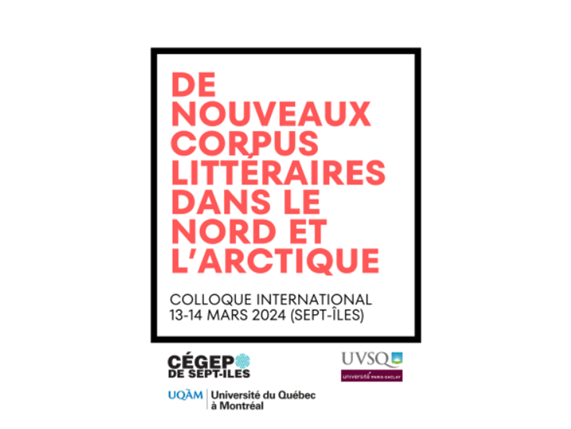An international colloquium on "De nouveaux corpus littéraires dans le Nord et dans l’Arctique" ("New Bodies of Literature in the North and the Arctic") will take place on 14-15 March 2024 at Cégep de Sept-Iles (Québec). Deadline for submission of papers is 11 December 2023.
The North and the Arctic have long been simplified in order to define a coherent and overall vision of them from an outsider’s point of view, thus downplaying certain cultures and literatures and masking the diversity of perspectives and cultural expressions of the men and women who live there.
Over the last twenty years, we have nevertheless been witnessing the unearthing (rather than the "emergence", since these cultures have existed for a long time) of bodies of literature whether autochtonous, regional, national, cross-cutting or historical, that define new paradigms of literary bodies and hilight the diversity of literary works in the North.

This international colloquium will focus on bodies of literature through research, publishing, translation, literary/historical forms of writing, digitalisation, study and teaching.
Particular attention will be paid to:
- Autochtonous literature (Innu, Atikamekw, Saami, Ainu, Inuit, etc.)
- Regional bodies within national literatures (Côte-Nord, Labrador, Abitibi, Alaska, Northern Norway, etc.)
- National bodies of literature (Faroe Islands, Estonia, Iceland, etc.)
- Cross-cutting perspectives (environmentalism, queer identities, feminism, etc.)
- Historical bodies (explorers, missionaries, etc.)
More information on the call for papers
The event is organised by UQAM/Laboratoire international de recherche sur l'imaginaire du Nord, de l'Hiver et de l'Arctique, GRENOC (Groupe de recherche sur l'écriture nord-côtière), Littoral (Cégep de Sept-Îles), UVSQ/Université Paris-Saclay - as part of the project 'From Nunavik to Iceland: Climate, Human and Culture through time across the coastal (sub)Arctic North Atlantic' (NICH-Arctic) - and the Centre de recherche interuniversitaire sur la littérature et la culture au Québec (CRILCQ).
Image: UQAM

